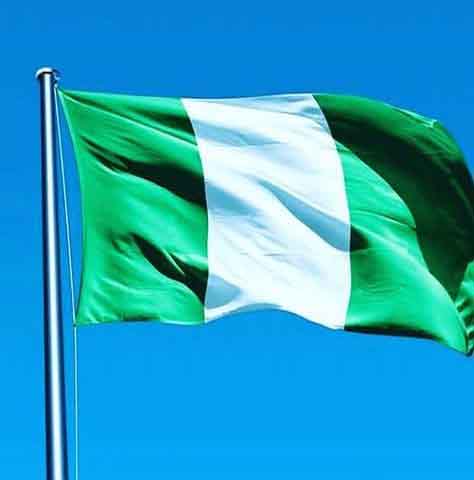This is the interesting facts, history and location of the Federal Republic of Nigeria.
Nigeria, officially the Federal Republic of Nigeria, is a country in the south east of West Africa. It lies along the coast of Bight of Benin and the Gulf of Guinea. Nigeria is bordered by Benin, Cameroon, Chad and Niger. It also shares maritime borders with Equitorial Guinea, Ghana and Sao Tome and Principe.
With an area of 923,768 km², the size of Nigeria is almost four times the size of the United Kingdom or slightly more than twice the size of the California States in the United States. Nigeria’s main rivers are the Niger, where it got its name from, and the Benue, the main tributary of the Niger.
The country’s highest point is Chappal Waddi (or Gangirwal) with 2,419 m (7,936 ft.), located in the Adamawa mountains in the Gashaka-Gumti National Park, Taraba State, on the border with Cameroon.
Nigeria has a population of 206.1 million people, making it the seventh most populous country in the world. The capital city is Abuja located in the center of the nation, while Lagos is the country’s primary port, economic hub and the largest city.
There are lots of ethnic groups in Nigeria which comprises of Yoruba, Hausa, Igbo, Fulani, Efik, Ibibo, Kanuri, Tiv and Edo. The largest groups are the Yoruba and Hausa. The languages that are spoken in the country are English, which is the official language, Hausa, Igbo, it is estimated that Nigeria has about 250 different ethno-linguistic groups. Islam and Christianity are the country’s major religions.
The currency accepted as the medium of exchange is the Naira.

Background History of the Federal Republic of Nigeria
British influence and control over what would become Nigeria and today Africa’s most populous country grew through the 19th century. A series of constitutions after World War II granted Nigeria greater autonomy; independence came in 1960. Most of the next 40 years Nigeria was ruled by two military juntas (1966–79 and 1983–98).
Only in 1999 a new constitution was adopted, and a peaceful transition to civilian government was completed. The government continues to face the daunting task of reforming a petroleum-based economy, whose revenues have been squandered through corruption and mismanagement, and institutionalizing democracy. In addition,
Nigeria continues to experience long-standing ethnic and religious tensions. Although both the 2003 and 2007 presidential elections were marred by significant irregularities and violence, Nigeria is currently experiencing its longest period of civilian rule since independence.
The general elections of April 2007 marked the first civilian-to-civilian transfer of power in the country’s history and the elections of 2011 were generally regarded as credible. In January 2014, Nigeria assumed a nonpermanent seat on the UN Security Council for the 2014-15 terms.
Nigeria is a Federal Republic with a presidential system. Chief of State, Head of the Government and Commander-in-Chief of the Armed Forces is the president. Nigeria’s constitution provides the separation of powers of the three branches (Executive branch, Legislative branch and Judicial branch).
The country has a mixed legal system of English common law, Islamic law (in 12 northern states), and traditional law. Sharia has been instituted as a main body of civil and criminal law in 9 Muslim-majority and in some parts of 3 Muslim-plurality states since 1999.

Tourism in Nigeria
In terms of tourism, Nigeria has many natural landmarks and wildlife reserves. Protected areas such as Cross River National Park and Yankari National Park have waterfalls, dense rainforest, savanna and rare primate habitats. One of the most recognizable sites is Zuma Rock, a 725m-tall monolith outside the capital of Abuja that’s pictured on the national currency.
See also accommodation in Nigeria
Thank you for reading this article.
Kindly follow our social media handles and let’s get interactive.
Related articles
Top Things To Do In Rwanda Kigali
